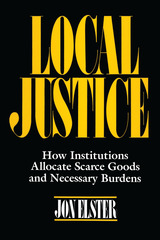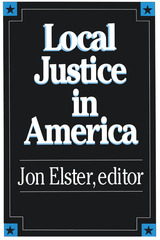2 books about Local Justice

Local Justice
How Institutions Allocate Scarce Goods and Necessary Burdens
Jon Elster
Russell Sage Foundation, 1992
The well-being of individuals routinely depends on their success in obtaining goods and avoiding burdens distributed by society. Local Justice offers the first systematic analysis of the principles and procedures used in dispensing "local justice" in situations as varied as the admission of students to college, the choice of patients for organ transplants, the selection of workers for layoffs, and the induction of men into the army. A prominent theorist in the field of rational choice and decision making, Jon Elster develops a rich selection of empirical examples and case studies to demonstrate the diversity of procedures used by institutions that mete out local justice. From this revealing material Elster fashions a conceptual framework for understanding why institutions make these crucial allocations in the ways they do. Elster's investigation discloses the many complex and varied approaches of such decision-making bodies as selective service and adoption agencies, employers and universities, prison and immigration authorities. What are the conflicting demands placed on these institutions by the needs of applicants, the recommendations of external agencies, and their own organizational imperatives? Often, as Elster shows, methods of allocation may actually aggravate social problems. For instance, the likelihood that handicapped or minority infants will be adopted is further decreased when agencies apply the same stringent screening criteria—exclusion of people over forty, single parents, working wives, and low-income families—that they use for more sought-after babies. Elster proposes a classification of the main principles and procedures used to match goods with individuals, charts the interactions among these mechanisms of local justice, and evaluates them in terms of fairness and efficiency. From his empirical groundwork, Elster builds an innovative analysis of the historical processes by which, at given times and under given circumstances, preferences become principles and principles become procedures. Local Justice concludes with a comparison of local justice systems with major contemporary theories of social justice—utilitarianism, John Rawls's A Theory of Justice, Robert Nozick's Anarchy, State, and Utopia—and discusses the "common-sense conception of justice" held by professional decision makers such as lawyers, economists, and politicians. The difference between what we say about justice and how we actually dispense it is the illuminating principle behind Elster's book. A perceptive and cosmopolitan study, Local Justice is a seminal work for all those concerned with the formation of ethical policy and social welfare—philosophers, economists, political scientists, health care professionals, policy makers, and educators.
[more]

Local Justice in America
Jon Elster
Russell Sage Foundation, 1995
Notions of justice and fairness are central to the American belief that the pursuit of a healthy and productive life is the right of all citizens. Yet in the real world there are seldom sufficient resources to meet the needs of everyone, and institutions are routinely forced to make difficult decisions regarding who will be favored and who will not. Local Justice in America is an insightful look into how selections are made in four critical areas: college admissions, kidney transplants, employee layoffs, and legalized immigration. This volume's case studies survey the history and modern rationale behind seemingly enigmatic allocation systems, chronicling the political and ethical debates, occasional scandals, and judicial battles that have shaped them. Though these selection processes differ significantly, each reflects a bitter struggle between opposing—and equally intense—principles of local justice. For example, are admissions officers who use special points to foster student diversity less fair than those who rely exclusively on scholastic achievement? How did the system of personal discretion among doctors selecting transplant patients come to be viewed by the public as more inequitable than compassionate? Does the use of seniority as a gauge in layoffs violate equal opportunity laws or provide employers with their only objective and neutral criterion? How have partisan interest groups repeatedly shifted immigration quotas between the extremes of xenophobia and altruism? In framing chapters, editor Jon Elster draws upon these studies to speculate on the unique nature of the American value system. Arguing that race matters deeply in all considerations of local justice, he discusses how our society's assessment of neediness balances on the often uneasy compromises between the desire to reward deserving individuals and the call to strengthen opportunities for disadvantaged groups. Well informed and stimulating, Local Justice in America speaks directly to policy debates in the fields of health, education, work, and immigration, and makes an important contribution to our understanding of the fundamental social issues that affect our daily welfare.
[more]
READERS
Browse our collection.
PUBLISHERS
See BiblioVault's publisher services.
STUDENT SERVICES
Files for college accessibility offices.
UChicago Accessibility Resources
home | accessibility | search | about | contact us
BiblioVault ® 2001 - 2024
The University of Chicago Press









